The Pew Research Center recently released a report that explores Americans’ views of open government data. The findings come from a survey of 3,212 members of the Pew Research Center’s American Trends Panel. Data collection is a core government function. The government collects data on demographics, economic change, climate activity, and many other areas relevant to public policy. There is a growing effort to make government activities more transparent by encouraging the release of more government-collected data to the public. Many Americans hope that increased data transparency will aid journalists, make officials more accountable, and improve decision making. Few think that government at the local, state, and federal levels are doing a great job of providing useful data.
Underutilized initiatives
Open government and open data initiatives are progressing, but the majority of Americans are not taking full advantage of them. Two thirds of Americans use the Internet to get more information about their government. Far less are utilizing open government initiatives where agencies are sharing data online for public use. The use of open data is limited to routine activities like looking up the hours of operation for a local park, paying a ticket, or renewing a license.
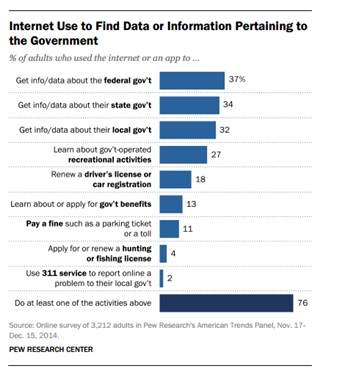
Source: Pew Research Center
Only 5 percent of Americans say that the federal government and state governments are very effective in sharing their data. Local governments fared slightly better with 7 percent of Americans saying they are very effective in sharing data. Government data sources are used by relatively few Americans to monitor issues. Twenty percent of Americans reported that they used these sources to find information about student and teacher performances. Only 17 percent searched government data sources for hospital or health care provider performance information. Only 7 percent of Americans monitor contracts between government agencies and outside firms using the government sources. Approximately 27 percent of respondents completed at least one of these three activities associated with monitoring government performance. Within this group Millennials, college graduates, and households earning over $75,000 were the most likely to engage in these activities.
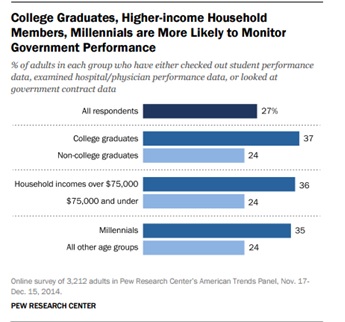
Source: Pew Research Center
Government performance versus government accountability
People’s views of government data initiatives are mixed. While Americans are optimistic about the potential of open data initiatives to improve government accountability, many are skeptical that the initiatives could improve government performance. Supporters of open data anticipate greater transparency in government activities to result in more public accountability and better customer service. Over half of Americans say open data could help journalists report more thoroughly on the government and 53 percent of people think it can make officials more accountable. Most Americans (66 percent) believe that open data will improve government accountability. On the other hand, open data’s impact on government performance is viewed more pessimistically. Less than half of Americans think open data can improve government services or officials’ decisions.
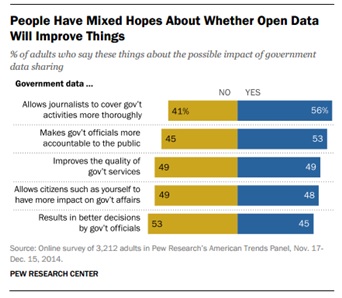
Source: Pew Research Center
Influence of political parties
Partisan affiliation strongly affects Americans’ views on trusting government, which appears to have a relationship with how people perceive open data and open government initiatives. Forty-eight percent of respondents in this survey sample identified themselves as being a member of or leaning toward the Democratic Party while 41 percent identified as Republicans or as leaning toward the Republican Party. Democrats are more likely to report that open data will have positive impacts than Republicans. For example, 58 percent of Democrats believe open data will make government officials more accountable to the public. Forty Five percent of Republicans expressed that same belief.
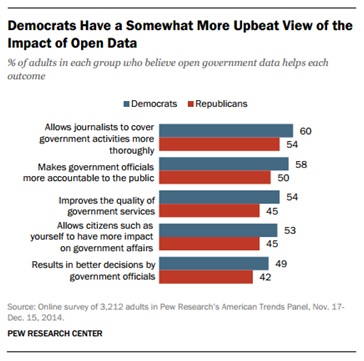
Source: Pew Research Center
Views on open data are not uniform
Americans have varied comfort levels with information transparency depending on the type of data. Most say they are comfortable with government sharing the health and safety records of restaurants online. Sixty-two percent of people are fine with government sharing information about the criminal records of individual citizens online. Sharing the performance data of individual teachers at schools online has the support of 60 percent of Americans. Fifty-four percent are comfortable with government sharing data regarding real estate transactions online. Lastly, only 22 percent of Americans would feel comfortable with government sharing information about the mortgages of individual homeowners online.
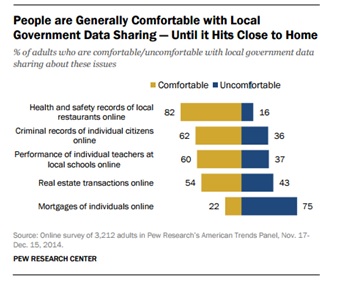
Source: Pew Research Center
Unaware of commercial value
Most Americans who own a smartphone are using mobile apps whose functionality is based on government data. Ninety-two percent of smartphone owners have used at least one app that is based on government data. Supporters of data transparency face the issue that consumers are unaware that government data is essential to key businesses. For example, government collection data on the weather are essential for weather-forecasters. In addition, many apps take advantage of the Global Positioning Systems (GPS), which is maintained by the government.
Of the two-thirds of Americans who own a smartphone, varying numbers use government data based apps:
- 84 percent have used weather apps to find out the forecast nearby.
- 81 percent have used map apps to navigate through a city or neighborhood.
- 66 percent have used an app to find out about nearby stores, bars or restaurants.
- 31 percent have used apps to get information about public transportation.
- 14 percent have used apps such as Uber or Lyft to hire cars.
Although government data is critical for many commercial applications, only 9 percent of Americans think that government data helps a lot with the private sector’s creation of new products and services. Forty-one percent think government data helps innovation somewhat. The results from the Pew Research Center survey show that most Americans have yet to delve too deeply into government data and its possibilities to closely monitor government performance.
The Brookings Institution is committed to quality, independence, and impact.
We are supported by a diverse array of funders. In line with our values and policies, each Brookings publication represents the sole views of its author(s).



Commentary
How do Americans view open government data?
May 11, 2015